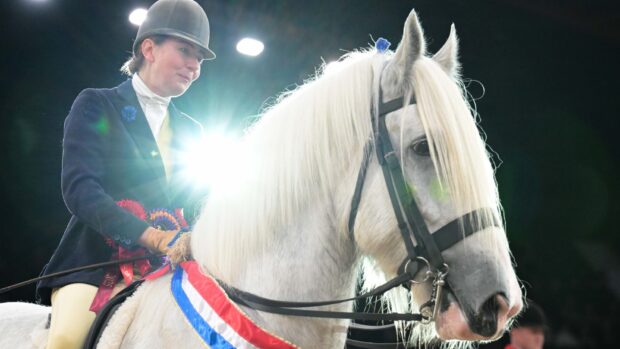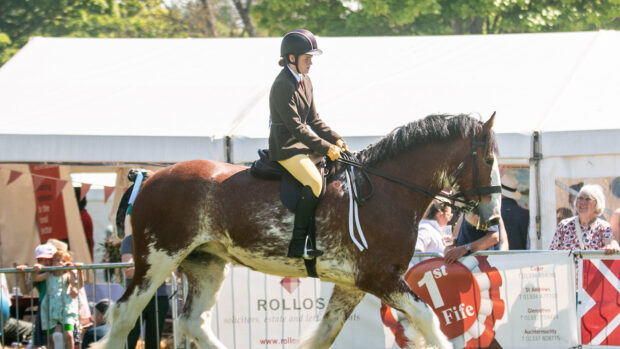A Clydesdale foal born at a heavy horse centre struggling with no income during the coronavirus pandemic has proved a ray of light in hard times.
Viv Cockburn and her daughter Anna, who run the not-for-profit Hay Farm Heavy Horse Centre in Northumberland, were delighted to welcome a healthy colt to their Clydesdale mare Primrose last Sunday (10 May).
Viv told H&H the foal is the first born to 10-year-old Primrose, sired by her childhood sweetheart, rare black Clydesdale horse Teddy, who was also born and brought up at the centre.

By Vic Cockburn
“Our vets were brilliant and we tried everything but just couldn’t get her in foal,” she said. “Then last summer, Northumberland Police were looking for a new horse. We thought we’d just run her with Teddy and see what happened, and the police said if she didn’t take, they’d consider her – and sure enough, she took. She obviously didn’t fancy being in the police.”
The foaling itself was straightforward, Viv said, although on a slightly chaotic night as the centre also had a pig due to farrow, a sheep lambing and a Welsh pony showing signs of colic at the same time.
And his arrival is good news for the breed, which is classed as vulnerable by the Rare Breeds Survival Trust (RBST).
“The Suffolk is in a bad way but there’s a lot of activity going on there, which is really good, but the Clydesdale is teetering a bit,” Viv said. “It seems a lot of mares are bought for riding and not breeding, which has an impact.”
The centre was set up some six years ago as the family had always had heavy horses, and noticed that even non-equestrians loved to see them.
The Cockburns took on a dilapidated steading, which is now home to 17 horses, as well as rare breed sheep and pigs, and two years ago earned RBST approval.
Their aim, as well as protecting and preserving the heavy horses, is to allow access to them to the public who may not otherwise have had a chance. They can not only meet the horses and watch professionals at work when the vets visit, but also get involved, such as driving them.
“There was a man here in his 80s a couple of years ago, propping up a wall; he said ‘I’ve just done something I never thought I’d do again’,” Viv said. “He’d been ploughing, like he used to at work.
“It’s all about being hands-on and learning about how important heavy horses were in our history. We also work with people who have Alzheimer’s, to help bring back memories.”
The centre has of course had to close its doors during lockdown, and is not eligible for any of the government help on offer. And as well as having the animals to feed, Viv was hit by a vet’s bill after the colt’s birth as he needed plasma administered twice.
Continues below…

‘Identical’ twin event horses both win on the same day
Both six-year-olds finished on their dressage scores, just 0.2 penalties apart

Showing competitors warned action could be taken over excess travelling and overweight ponies

Subscribe to Horse & Hound magazine today – and enjoy unlimited website access all year round
“We applied for government support but we’re not eligible for anything,” she said. “My husband drives a lorry delivering food and we’re using his wages to keep the centre going. We’ve always relied on donations for people to come as we wanted to keep it accessible for everyone.
“We started a fundraising page as we had some regulars saying they were thinking about us and wanted to donate, and it’s so lovely so many people have donated as we don’t know when we’ll be able to re-open.
“It’s so nice to have the foal as everything is so awful at the moment.”
We continue to publish Horse & Hound magazine weekly during the coronavirus pandemic, as well as keeping horseandhound.co.uk up to date with all the breaking news, features and more. Click here for info about magazine subscriptions (six issues for £6) and access to our premium H&H Plus content online.




